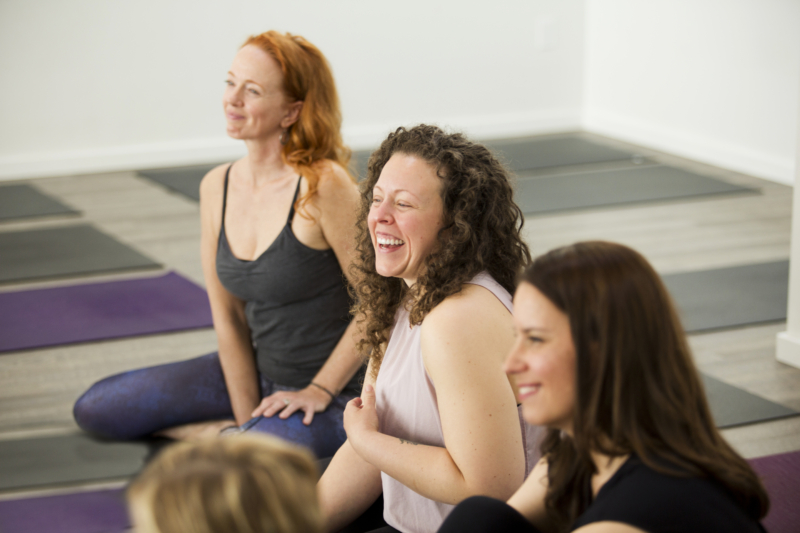My yoga is mine, no matter my size.
My breath, my body, my spirit, my yoga.
I recently read an article by Jessamyn Stanley titled, “the Invisible Glass Ceiling of Yoga: Body positivity and The Future of Western Yoga,” and it resonated so strongly with me because of some parallels in my personal yoga journey. In her article, Jessamyn clearly articulates some of the ways that body types, specifically large bodied yogis are received and treated in our current culture of Yoga. She scoops nice and deep into the body positivity conversation and she provides some well-placed challenges to our societal norms. The largest take away from the reading for me is that I am not alone in how I’ve moved through yoga culture and you aren’t either.
Before I selected a studio and committed to my Yoga Teacher Training program to deepen my practice and understanding of yoga, I was a stray. I would bounce from studio to studio trying out different beginner deals and different studios in my acceptable mileage range. I started this practice, my studio tours, in 2003. My range spanned the South Sound from Renton to Olympia as wide as Maple Valley to Bainbridge Island.
Every time I entered a new space, they would ask the same question, “Is this your first time doing yoga?”—that’s good, it’s awesome to know the level of your students to support them in their journey and offer new practitioners additional context for practice. Sometimes though, I’d get a follow-up question attached to a visual scan of my body, “Where do you practice?” The first time this question came up I didn’t really think anything of it. It happened again though… more than once, more than 3 times. At that point, it became significant for me and my inner dialog was hyper-active: Did they think I was lying about taking classes before to try to be cool, do I not belong here, do they not like something about me, should I not practice here because I’m not skinny, do only skinny people come here, will I not be able to keep up in classes, can I ask questions after class for modifications or will that justify their stance that I don’t belong, should I do the things they’re saying even though it hurts (no, by the way)?
When I first came to studio yoga classes, I was proud of myself for being brave (because I was scared to try something rooted in physical ability—my belief at the time) and excited to find out what the community would be like in the yoga world and be a part of it. As I continued to bounce around and receive less than inclusive welcomes, I started to feel alienated in the spaces and started to develop a competitive relationship with myself in my practice. I needed to prove to myself that I was physically strong enough and good enough to practice in these beautiful and serene spaces that I liked so much but didn’t feel worthy of. No matter how much I pushed myself, I continued to feel apart from the community of it though.
That sucked. There were times and ways that I pushed myself that weren’t safe and most definitely not with respect for my needs, my body, or my mental emotional well-being.
There was a shifting point, I found a studio that offered more than a focus on a purely physical practice and multiple teachers who offered snippets of yogic philosophy that was always relevant and always timely. I saw my practice in an entirely new light and saw potential to develop my relationship to my yoga in a fresh way.
“Asana practice is not fundamentally about the asana, but about the practitioner.” This quote is from Gray Kraftsow’s book, Yoga For Transformation and the first time I came across it, it was like permission to own my experience in my practice and come back—come home to myself and away from every other student in class. I began to feel gratitude for the spaces I practiced where there were no mirrors. In mirrored studios, it was so easy to see other students take deeper/stronger/(insert judgement of choice here) expressions of a pose and jump back to that challenge-accepted mentality; just like that I was out of my body and out of my present.
As I started to understand and accept the deeper practices of yoga including but not limited to: intense self-study, pranayama and meditation, I began to understand where I was at and accept that as my starting point. Yoga in Sanskrit means union, union of body, mind, and spirit. To take one without respect to the others doesn’t provide the full scope or integration of benefits, it’s incomplete. With new found permission to look at my practice individualized and feel into my asana, physical practice, with a goal of feeling good, feeling strong, stable and capable I had become a more advanced student awakened to my own inner wisdom. Yoga is a practice of acceptance, acceptance of what is true, acceptance of what is now, acceptance of transition-transformation.
Fast forward… I’m a yoga teacher now so I’m automatically a part of the community and I naturally and seamlessly fit into every space without question, right? Nope! I still experience and encounter receptions that feel less than inclusive. I still question my relevance and my worthiness for spaces and places within yoga culture, I’m just like you; I’m practicing. Sometimes it’s easier than others, but I chose to see these moments as invitation to practice. I come back to my practice of acceptance, acceptance for what is true and what is now. I know that my yoga is in my breath, in the alignment of my bones. It’s in the stability of my muscles contracting in opposing strength on either sides of my joints. My yoga is in my cultivation of mental strength and attuned focus. My yoga is mine. I find empowerment in that.
I invite you to join me to work with yoga as a practice of acceptance, work from where you are, work from who you are. Work from now, again and again and again.





